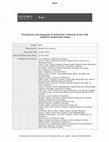Papers by Christine Bastin
Neuropsychology, 2003
Whether the format of a recognition memory task influences the contribution of recollection and f... more Whether the format of a recognition memory task influences the contribution of recollection and familiarity to performance is a matter of debate. The authors investigated this issue by comparing the performance of 64 young (mean age ϭ 21.7 years; mean education ϭ 14.5 years) and 62 older participants (mean age ϭ 64.4 years; mean education ϭ 14.2 years) on a yes-no and a forced-choice recognition task for unfamiliar faces using the rememberknow-guess procedure. Familiarity contributed more to forced-choice than to yes-no performance. Moreover, older participants, who showed a decrease in recollection together with an increase in familiarity, performed better on the forced-choice task than on the yes-no task, whereas younger participants showed the opposite pattern.

Brain : a journal of neurology, Jan 17, 2015
Three sets of research criteria are available for diagnosis of Alzheimer's disease in subject... more Three sets of research criteria are available for diagnosis of Alzheimer's disease in subjects with mild cognitive impairment: the International Working Group-1, International Working Group-2, and National Institute of Aging-Alzheimer Association criteria. We compared the prevalence and prognosis of Alzheimer's disease at the mild cognitive impairment stage according to these criteria. Subjects with mild cognitive impairment (n = 1607), 766 of whom had both amyloid and neuronal injury markers, were recruited from 13 cohorts. We used cognitive test performance and available biomarkers to classify subjects as prodromal Alzheimer's disease according to International Working Group-1 and International Working Group-2 criteria and in the high Alzheimer's disease likelihood group, conflicting biomarker groups (isolated amyloid pathology or suspected non-Alzheimer pathophysiology), and low Alzheimer's disease likelihood group according to the National Institute of Ageing...
Cognitive neuropsychology, 2015
Over the last decade, many studies have demonstrated that visuospatial working memory (VSWM) can ... more Over the last decade, many studies have demonstrated that visuospatial working memory (VSWM) can be divided into separate subsystems dedicated to the retention of visual patterns and their serial order. Impaired VSWM has been suggested to exacerbate left visual neglect in right-brain-damaged individuals. The aim of this study was to investigate the segregation between spatial-sequential and spatial-simultaneous working memory in individuals with neglect. We demonstrated that patterns of results on these VSWM tasks can be dissociated. Spatial-simultaneous and sequential aspects of VSWM can be selectively impaired in unilateral neglect. Our results support the hypothesis of multiple VSWM subsystems, which should be taken into account to better understand neglect-related deficits.

Cortex, 2015
Studies have reported that patients in the severe stages of Alzheimer&amp... more Studies have reported that patients in the severe stages of Alzheimer's disease (AD) experience difficulties recognizing their own faces in recent photographs. Two case reports of late-stage AD showed that this loss of self-face recognition was temporally graded: photographs from the remote past were recognized more easily than more recent photographs. Little is known about the neural correlates of own face recognition abilities in AD patients, while neuroimaging studies in healthy adults have related these abilities to a bilateral fronto-parieto-occipital network. In this study, two behavioral experiments (experiments 1 and 2) and one functional magnetic resonance imaging (fMRI) experiment (second part of experiment 2) were conducted to compare mild AD patients (experiment 1) and moderate AD patients (experiment 2) with healthy older participants in a recognition task involving self and familiar faces from different decades of the participants' life. In moderate AD patients, variable performance allowed us to examine correlations between scores and resting-state fMRI in order to link behavioral data to cerebral activity. At the behavioral level, the results revealed that, in mild AD, self and familiar face recognition was preserved. Moreover, mild AD patients and healthy older participants showed an inverse temporal gradient, with faster recognition of self and familiar recent photographs than self and familiar remote photographs. However, in moderate AD, both self and familiar face recognition were affected. fMRI results showed that the higher the connectivity between the dorsomedial prefrontal cortex (dMPFC) and the right superior frontal gyrus (rSFG), the lower the self and familiar face recognition scores in moderate AD patients. Given that previous studies have related the superior frontal region to control processes rather than face recognition processes, these results might reflect less segregation and more interference between brain networks in AD. In other words, impaired face recognition in AD may be related to functional dedifferentiation of specific brain regions.

Neurocase, 2004
Some patients with relatively selective hippocampal damage have shown proportionate recall and re... more Some patients with relatively selective hippocampal damage have shown proportionate recall and recognition deficits. Moreover, familiarity as well as recollection have been found to be impaired in some of these patients. In contrast, other patients with apparently similar damage presented with relatively preserved recognition despite having severely impaired recall, and some of these patients have been shown to have preserved familiarity. We report here the case of an amnesic patient who suffered bilateral hippocampal damage and temporoparietal atrophy after carbon monoxide poisoning. On tests matched for difficulty, his recall performance was more severely impaired than his recognition memory, for verbal as well as for visual materials. Moreover, he performed within the range of healthy matched subjects on nine recognition tests out of ten. In a task using the process dissociation procedure, the patient's familiarity was preserved although his recollection was impaired. These f...
Autobiographical memory in amnestic Mild Cognitive Impairment (aMCI) is characterized by impaired... more Autobiographical memory in amnestic Mild Cognitive Impairment (aMCI) is characterized by impaired retrieval of episodic memories, but relatively preserved personal semantic knowledge.
Cortex; a journal devoted to the study of the nervous system and behavior, 2014
Uploads
Papers by Christine Bastin